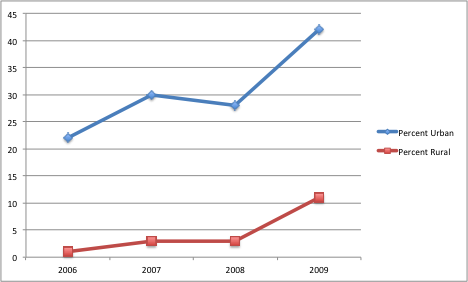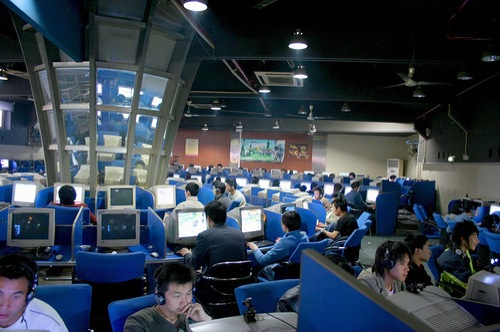People and Organizations Online: Stage 3-4
Internet usage is rapidly expanding in China. In May 2010, broadband Internet connections numbered 346 million. That may seem impressive, but overall, Internet access penetration is only at 29%. However, Internet access depends a lot on where one lives. A Gallup survey done in 2009 indicates that 42% of people living in urban areas have access to the Internet at home. The same survey indicates that only 11% in rural areas have Internet access.
Percentages of Urban and Rural Users with Home Internet Access (2006-2009)

Source: Gallup
Clearly, Internet usage is growing very fast, although rural areas have some very big catching up to do. One important thing to note about these percentage increases is that, because the population of China is so large, these statistics mean that between 2007 and 2009, 90 million people gained access to the Internet. The gap between rural Internet and urban Internet use has been increasing during the time period of this survey. Overall, rural Internet users accounted for only 24.7% of the country's population and urban Internet users are 72.6% of users.

Internet Cafe in China (Source)
In 2005, according to Gallup, more than half of adults between ages 18-24 said they had accessed the Internet. Given the record growth between 2005 and present, it is likely that this number has grown significantly. According to China Daily, in 2010, China had more than 130,000 licensed Internet cafes spread throughout the country, and giving access to those that may not have it at home. Bloomberg Business Week reports that some Chinese people are worried about Internet addiction and as a result the government has started cracking down on illegally operated cafes.
Even though the Internet may not be available for home use for many people, because almost half of users can access the Internet from home, and others can access via plentiful Internet cafes, China is in a Stage 4 for People and Organizations online, but only in large cities. For smaller, rural communities, the Internet is just starting to become a part of everyday life, and rural areas more closely resemble a Stage 3.
Locally Relevant Content: Stage 4
There is no shortage of websites in Chinese, and many websites are updated frequently.
The largest search engine in China is Baidu, which controls 73% of the market for searches, according to Business Week. This is odd because in many parts of the world, Google is the dominant search engine. Google had attempted to operate within China, but may have found themselves victims to Baidu.
Baidu routinely censors web searches that are deemed inappropriate by the Chinese government, and many believe that the Chinese government favors the search engine. Google China, which had previously censored searches, decided in 2010 to stop censorship and instead redirect users to its Hong Kong site, which does not require the same censorship.
While Google itself no longer censors the searches, the Chinese government often makes it appear as if the Google Hong Kong website is unavailable. Even when Google was operating and censoring in China, users attempting to go the Chinese Google site would find themselves at Baidu instead. This "DNS poisoning" tactic may help Baidu increase their search market share.
In addition to the search engine, Baidu also operates a Wikipedia-like site that is in Chinese, bulletin boards, and a Q&A service, providing ample opportunity for users in China to interact with others in their own language on the Baidu site.
There are plenty of other sites available for users in China to see updated daily news and other information about the country. China Daily offers news, as does the country's official Xinhau News agency. However, the Chinese government officially recognizes these sites. Users that wish to read news about China from a foreign source often find that websites like the BBC News China site are inaccessible.
Many other foreign websites are available in Chinese, but blocked. Facebook, Twitter, YouTube, and Flickr are routinely not available. Greatfirewall.biz keeps track of websites and searches that are blocked, although this site is obviously not available within China.
Even if foreign websites are often blocked, there is no shortage of websites for local use including:
- Fanfou.com, a Twitter-like service
- WordKu.com, a dictionary service
- Bullog.org, a blog hosting service
- Wuqing.org, a blog hosting service
The Chinese government also often censors usage of these websites. The Guardian (UK) reported that in 2009 on the anniversary of the Tienanmen Square massacre that many websites reported that they were "down for maintenance." It was unclear whether the government ordered the sites down or if it was a form of self-censorship to avoid problems with the government. The most obvious example is to do an image search and type in "Tienanmen Square." At Google, this search returns mostly the famous photo of the man in standing up to the tanks in the square. At Baidu, the images returned are mostly of people being happy in the square. A message at Baidu says, "according to relevant laws and regulations and policies, some search results have not been shown."
Sample searches for Tienanmen Square: Google, Baidu
Because there are many local websites available with updated and relevant local information that are accessible to all, China is at Stage 4 for locally relevant content. However, the framework does not appropriately deal with the censorship of the Internet, which may make the local information less useful.
ICTs in Everyday Life: Stage 3

According to the Chronicle of Higher Education, despite the censorship of the Internet in China, people still find uses. Users in college were found to routinely check e-mail, chat online, and play video games at Internet cafes. Users in college said they primarily were interested in using the Internet as a social medium because of the restrictions. Additionally, the study also found that college students are now coming to school with laptops now, which is also increasing Internet access. However, some users of the Internet in China do discuss issues on the Internet on the web portal Baidu, which was discussed earlier in this section.
More generally, people are using the Internet in ways one would expect in a developed country. According to the Chinese government, 85% of Internet users read news online, while almost 66% users do in rural areas. 78% users in urban China use search engines, while almost 66% of users in rural areas do the same. Some other statistics include:
- 68.9%: urban users who listen to online music
- 47.1%: urban users who play games
- 60.9%: urban users who watch TV or movies online
AS discussed earlier, 130,000 licensed Internet cafes provide access to people that do not have Internet access at home. According to the CIA, 747 million people had mobile cellular service in 2009. The International Telecommunications Union reports that there are a total of three services that provide 2G wireless data service in China, and four that provide wireless 3G data service in China. Twenty-two companies provide Internet services. On New Years' Eve 2010, 1.3 million SMS messages were sent. As of 2009, 39.5% of people had accessed the Internet from a mobile device. Clearly, mobile technology is readily available in China.
Presently, according to the CNNIC, 28.6% of people between 20-29 and 21.5% of people between 30-39 are on the Internet. Those over 40 are less inclined to use the Internet, but their numbers are still growing slowly.
Obviously, the country is still rapidly developing, but because it has reached so many people, the ICTs in everyday life is at Stage 4 in urban China. Again, since rural China is lagging, it may be considered more to have a Stage 3 status.
ICTs in the Workplace: Stage 3
Home Internet usage grew much faster than Internet usage at work. As of 2008, 20.7% of users accessed the Internet at work. That number grew to 30.2% by 2009, according toe the CCNIC.
Of the users that have access at work, 71.9% of them use the Internet for information searching. Instant messaging and e-mail came into use by 60.4% and 75% of users at work. Usage for productivity is much lower, according to the CCNIC. Only 4.4% of users at work reported using the Internet for online sales. A mere 22.4% of Internet users at work used online payment, and travel booking was only used by 6.8% of users.
25.5% of users at work used the Internet to conduct online banking, and 15.5% used the Internet for online trading.
There are more than 16.8 million domain names ending in ".cn" that are registered in China. This is a vast increase from the only 1.8 million registered during 2004. 0.34% of those websites belong to the government--that is more than 45,000 websites.
China is at a Stage 3 for ICTs in the Workplace as computers are still not that commonplace. China is rapidly moving toward Stage 4 and will likely reach that point soon as those that have been using the Internet at their homes start to move the technology to the workplace.